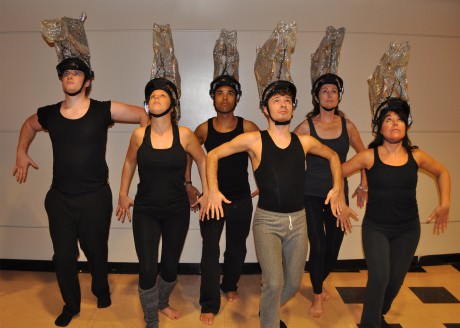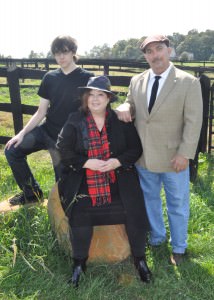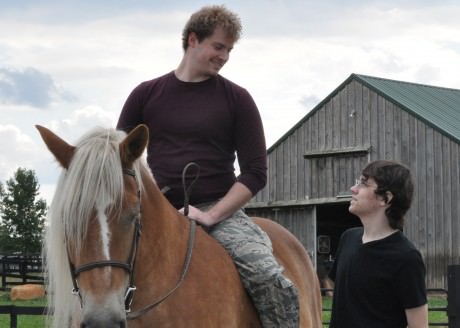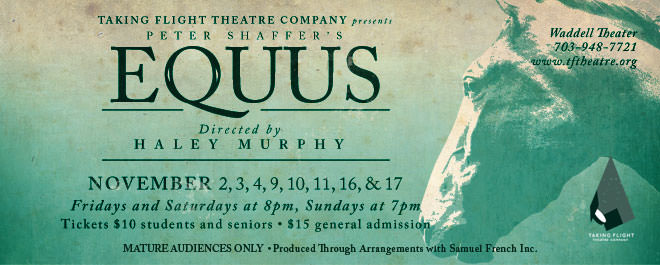Equus, Peter Shaffer’s 1973 Tony Award-winning psychological drama, inspired in part by a true story, tells the story of over-worked middle-aged psychiatrist Tel Monks (Dr. Dysart) and his young pubescent patient, Brian Maas (Alan Strang). Alan has committed an unthinkable crime and Dysart’s attempts to unravel why a lover of horses maimed and blinded six horses by gouging out their eyes. He wonders what kind of life this teenage boy had led that would give him such powerful feelings of anger and shame.

It is common for professional helpers’ efforts in helping others to lead to their own crisis of self-doubt, as is the case with Monks. While this and other mysteries abound throughout the play, our logical brain still relies on solving the crime to relieve tension and restore homeostasis, or at least the semblance of a stable society. Equus will challenge your thinking and coax you to continue your search for meaning.
Thanks to Producer Colleen Stock, Director Haley Murphy, and Assistant Director Karl Meier for their mutual willingness to explore a nearly forty year old classic whose complex religious and psychological themes of identity (conformity, transcendence, sexuality, and the ultimate meaning of life), are even more relevant in today’s high stress, industrialized society.
I am always fascinated with understanding why people act violently and what deep forces within gain the upper hand and cause them to go askance. As directors you successfully maintained the balance Shaffer envisioned between a competing montage of self- identity crises and normalcy by physically grounding the stage setting (minimal movement) and allowing the audience to focus on, ponder and perhaps experience or recall some of the bewildering emotions of Alan’s mental state.
Bryan Maas (Alan Strang) a very young man himself, just post-high school theatre, plays a bewildered, even pathetic protagonist who has episodes of lust, obsession and sexual confusion aroused by horses. He is called upon to play an extremely complex role even for highly seasoned actors. Add to that dysfunctional parenting, religious and ritualistic sacrifice themes, a personal theology based on horses and belief in a supreme godhead (“Equus”). And Maas did a fine job portraying anger, confusion, and sexual knowledge in this challenging role.
Tel Monks (Dr. Dysart) shares center stage with Bryan Maas and provides psychological discourse and biblical dialogue (that at times is a bit overwhelming because its length made me forget sometimes what was said at the beginning of his long dialogues). Monks is a well-seasoned veteran actor, and I thoroughly enjoyed his recitation and references to Job 39:19-25 and Revelations 19: 11-12: white horse, “Faithful and True,” and eyes “as a flame of fire,” and also the repeated phrase, “What desire could that be?”

Portraying Alan’s mother, Dora Strang, Sally Cusenza delivered a fine combination of maternalistic attributes not usually viewed favorably by anyone. Yet despite this negative, she comes across as likeable. One should keep in mind, however, that as a mother who attributes her son’s act to “the Devil,” her viewpoint is not innocent and cannot be dismissed lightly – as is to be expected – she attacked conventional psychiatry that blames parents for children’s neuroses. As mother and grandparent, I identified, in part, when she stood up to Dr. Dysart quite vociferously and defended why he did this terrible thing insisting that he recognize that “Alan is himself. Every soul is itself.” His “illness” is a part of his selfhood. [Because] “—that’s him; not just all of our things added up.”
Susan D. Garvey (Hesther Saloman), [consider symbolism: The Book of Esther and Songs of Songs by King Solomon] a court magistrate who recognized Alan as a victim in psychological pain and relies on Dr. Dysart for Alan’s cure, provides a confident buoyancy and hope, albeit optimism which no one else shares. Her seasoned acting capably portrayed a feeling of high expectations that the doctor will cure the troubled youth, but also that she need not make any personal sacrifices to assist.
Shaina Higgins (Jill Mason) provided superb acting and fine stage presence from the moment she stepped on stage. Her speech enunciation was crystal clear, she carried the right tone for the dialogue, and was effectively timed, and she looked very ‘English.”
David Segal (Frank Strang), portraying Alan’s atheist father, and also a printer, gives a fine performance. His character was affable, primarily because I found no undercurrent of angst between him and Sally Cusenza (Dora Strang), yet even as they blamed each other, they were not bitter. Like far too many parents, they were as confused about their son as anyone else and were unable to comprehend his crime. As is seldom the case, it is difficult to turn the mirror introspectively and look at one’s own contribution to the situation.
A bravura performance, to my surprise, was produced by an actor who spoke not a single word – William Spilman, who played Young Horseman/Nugget. His onstage presence, prominence and stature were effective in adding to his stellar portrayal of a brown, chestnut-colored horse, that I could almost forget that the line still existed that could never be bridged between human and horse.
Sam Hall, Robin Lundgren, Kate Meier, Cathy Rieder, and Christoff Visscher were superb in playing the additional horsemen. While it was impossible to tell which actors were playing horse roles, with the exception of the superb William Spilman (Young Horseman/Nugget), it really didn’t matter because of the beautiful, enthralling choreography by Heide Zufall, and the artistically-crafted horses heads created by Marco Rand. As graceful as ballet dancers, without a single word spoken, their performances for a short time melded the anthropological distance between humans and animals.
Wayne Jacques (Nurse) managed to take a minor character and give him believability, providing good acting talent. I truly doubted the waif-like protagonist Alan Strang would have prevailed in a confrontation with him.
Dino Coppa (Harry Dalton) as owner of horse stable, was also a likeable character, displaying a somewhat aristocratic towards. There is a certain aura around seasoned actors, for they exude confidence no matter how minor the roles they play may be. I felt that was true of him.
Regarding Kevin King’s Set Design, I could not help but notice that the benches were too short for the actors (either Alan’s six foot plus height or his mother’s girth) for even two people to sit or lie on them. Surely uncomfortable – was this intended to emulate a detective/interrogation-like atmosphere? Why not a traditional psychologists’ couch? Also, it is usually distracting when actors have to come out of role to move furniture and props around, thus I also wondered if stage personnel could not have shouldered this responsibility more effectively.
Lighting Designer Jeff Auerbach, Light Board/Master Electrician Ian Claar, and Lightboard Operators Amy Narron and Emily Williams provided well-balanced illumination. I particularly liked the semi-darkness of the actors who sat tucked away to the far left rear of the set. Their voices contributed to the scenes when called for in the script and gave the audience the ethnographic feel of participant-observers to a fight scene or, for me, a church congregation.
Another highlight for me was the syncopation of musical sounds simulating horses’ movements provided by Sound Designer Chris Alpiar, Sound Assistant Drew Moberley, and Sound Board Operators Colton Brown, Trevor Johnston, and Jon Roberts. One could close eyes tight and almost feel the thunder of horses with all their weight and strength approaching. Dialogue delivered by Bryan Maas that spoke of the horses’ might, sweat and heat further enhanced this feeling. Equally so, the times when the horse(s) were quiet, obedient to their master’s beck and call, were heightened by the drama of the music.

Judy Whelihan’s costume designs helped the actors to support their roles, not detract from them. Their ‘English-style’ clothing gave the aura of country lifestyles. I was most pleased with the wardrobe of the horse actors, who were clothed in full body black, brown, and grey leotards, then crowned with those magnificent, gleaming horses heads. Designed by Marco Rondo, these stunning creations stole the show.
Special kudos to Choreographer Heide Zufall and her Dance Captain Sam Hall. If I were giving out Hollywood awards, they would definitely take first place. It bears repeating, the horse dance routines were phenomenal.
Taking Flight Theatre Company is presenting a superb production of Equus, one that should not be missed.
Running Time: Two hours plus a 15 minute intermission.
Equus plays through November 18, 2012 at Taking Flight Theatre Company at Northern Virginia Community College’s Loudon campus – 1000 Harry Flood Byrd Highway, in Sterling, VA. For tickets, purchase them online, or purchase them at the door.





